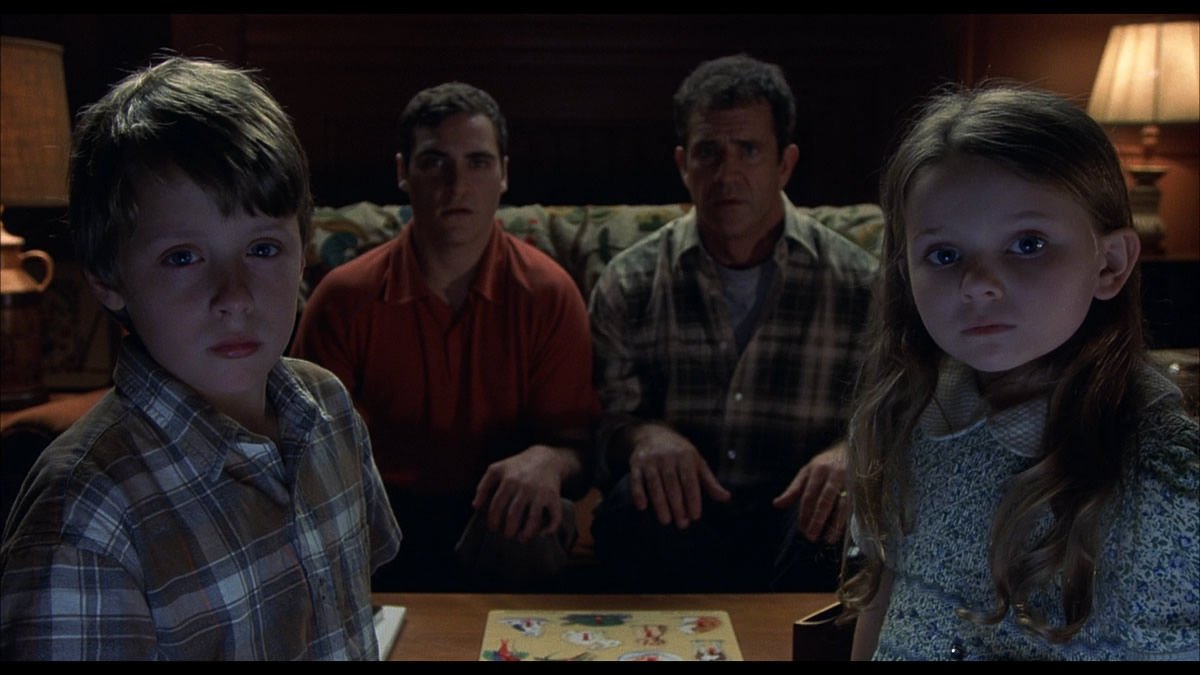Signs (2002)

M. Night Shyamalan’s 2002 film “Signs” masterfully intertwines themes of faith, fear, and the unknown with a compelling narrative that leaves a lasting impact on its audience. This psychological thriller, starring Mel Gibson and Joaquin Phoenix, stands out for its ability to blend suspense with deeper philosophical questions, exploring the profound impact of personal beliefs on how we interpret the world around us.
“Signs” is set on a remote farm in Pennsylvania, where former priest Graham Hess (Mel Gibson) lives with his two children, Morgan (Rory Culkin) and Bo (Abigail Breslin), and his brother, Merrill (Joaquin Phoenix). The narrative unfolds as the Hess family discovers mysterious crop circles in their fields, which initially appear to be inexplicable phenomena. The story evolves from a suspenseful thriller into a deeper exploration of faith and purpose.
The film’s tension builds as it becomes apparent that these crop circles are part of a larger, more menacing presence. The Hess family must grapple with the implications of these strange occurrences, all while dealing with personal traumas and unresolved issues related to Graham’s loss of faith after his wife’s tragic death.

One of the most significant themes in “Signs” is the interplay between faith and skepticism. Graham Hess’s character undergoes a profound transformation throughout the film. Initially, he is a man disillusioned with his faith, unable to find meaning or purpose after his wife’s death. However, the crop circles and the unfolding events force him to confront his beliefs and question whether there is a larger plan at play.
The film also explores the theme of fear—both the fear of the unknown and the fear of losing control. The crop circles symbolize not just an external threat but also the internal anxieties of the characters. Shyamalan uses suspense and psychological tension to reflect the characters’ inner turmoil, allowing the audience to experience the same sense of uncertainty and dread.

The development of the characters is central to the film’s impact. Graham Hess, portrayed with depth and nuance by Mel Gibson, represents the struggle between faith and doubt. His journey from a man who has lost his belief in a higher power to one who finds renewed purpose is both poignant and thought-provoking.
Merrill Hess, played by Joaquin Phoenix, provides a contrasting perspective. As a former baseball player, Merrill’s character grapples with his own sense of failure and redemption. His role in the story underscores themes of personal significance and the search for meaning in the face of adversity.
The children, Morgan and Bo, are not merely peripheral characters but essential to the film’s emotional core. Bo’s innocent observations and fears add layers of vulnerability and humanity, while Morgan’s illness and bravery highlight the family’s collective struggle and resilience.

Shyamalan’s use of suspense is remarkable, employing a minimalist approach that emphasizes atmosphere over gore. The film’s cinematography, by Tak Fujimoto, creates an immersive experience, utilizing shadows and sound to heighten tension. The crop circles themselves, while simple, become powerful symbols of the unknown and the extraordinary.
The sound design and score, composed by James Newton Howard, further enhance the film’s eerie ambiance. The music subtly underscores the emotional and psychological states of the characters, complementing the film’s suspenseful tone.
“Signs” is a thought-provoking film that combines suspenseful storytelling with profound themes of faith and the human condition. M. Night Shyamalan’s direction, coupled with strong performances from the cast, ensures that the film remains a compelling exploration of how we confront the unknown and seek meaning in our lives. Its ability to provoke reflection on personal beliefs and fears, while delivering a gripping narrative, makes “Signs” a standout entry in the psychological thriller genre.










